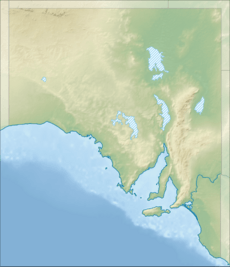Bales Beach Aquatic Reserve facts for kids
Quick facts for kids Bales Beach Aquatic ReserveSouth Australia |
|
|---|---|
|
IUCN Category II (National Park)
|
|
| Nearest town or city | Vivonne Bay. |
| Established | after 1971 |
| Abolished | 20 October 2016 |
| Area | 7.3 km2 (2.8 sq mi) |
| Managing authorities | Primary Industries and Regions SA (PIRSA) |
| Footnotes | Coordinates Nearest town |
| See also | Protected areas of South Australia |
Bales Beach Aquatic Reserve was a special protected area in the ocean. It was located in South Australia, off the south coast of Kangaroo Island. This reserve was right next to Seal Bay. It included the beach area where the tide goes in and out.
Why Was This Area Protected?
The Bales Beach Aquatic Reserve was created after 1971. Its main goal was to protect a very important breeding spot. This spot was home to a large group of Australian sea lions. These amazing animals needed a safe place to live and raise their young.
To keep the sea lions safe, strict rules were in place. It was against the rules to collect or remove any sea creatures from the reserve. This meant no fishing, no taking shells, and no disturbing the marine life.
Where Was the Reserve Located?
This aquatic reserve was very close to the Seal Bay Aquatic Reserve. It stretched about 5 kilometers (3 miles) to the east. It also went out into the sea for about 1 nautical mile (1.85 kilometers or 1.15 miles). The total area of the reserve was about 7.3 square kilometers (2.8 square miles).
Even though it was managed alongside the Seal Bay Aquatic Reserve, it was officially a separate protected area.
What Happened to the Reserve?
On 20 October 2016, the Bales Beach Aquatic Reserve was officially closed down. But this doesn't mean the area is no longer protected!
Since 2012, this same area has been part of a larger protected zone. It is now inside a "habitat protection zone" within the Southern Kangaroo Island Marine Park. This means the sea lions and other marine life are still safe.
How Was It Classified?
The Bales Beach Aquatic Reserve was classified as an IUCN Category II protected area. This classification means it was managed mainly for protecting ecosystems and for recreation. It was like a national park, but for the ocean!
 | Roy Wilkins |
 | John Lewis |
 | Linda Carol Brown |


